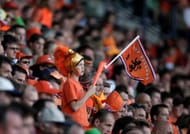
With the sport earlier dominated by English clubs, the 1980s is seen as the turning point in football history. This period posed to be one of the darkest phases British football ever faced. In 1985, a five-year ban from European leagues was imposed on all English clubs, after the bitter clash between Liverpool and Juventus at the Heysel Stadium, which led to 39 casualties and severe injuries to hundreds.
Nevertheless, other countries grabbed the opportunity to prove their mettle in the game. Germany emerged as the winners of the European League in 1980, and also reached the finals in the World Cups of 1982 and 1986, where they lost to Italy and Argentina respectively. Welsh football was also on the rise, with Swansea City and Cardiff at its spearhead. However, financial shortcomings led to their ruination.
Spain, which hosted the 1982 World Cup, staggered on the national front. Real Madrid was its prime club, winning 6 domestic titles in the decade, with Barcelona, Real Sociedad and Athletic Bilbao sharing the same feat before Real’s dominion. Meanwhile, the chapter for Italy turned out to be a golden one, with the country emerging as champions in 1982. With van Basten, Maradona and Platini on their side, Italy had one of the strongest teams.
Unfortunately, the decade ended with what is considered the most tragic football events ever – the Hillsborough Stadium disaster of 1989. 96 fans were crushed to death at the FA Cup semi-final in Sheffield. A larger-than-expected crowd filled up the centre pen of the stadium, leading to a mass rampage.
Technically, a forward is simply a player who plays in the front line of the team, and hence includes inside forwards, center forwards and wing forwards, amongst others. However, a striker is one whose sole objective is to net the ball, i.e. score goals. Sometimes, the difference is respected to an extent where the two positions are considered completely exclusive of each other. The terms are, however, still used interchangeably and no accurate distinction can be made, and thus, the list of forwards included in this article includes strikers as well.
While many varying opinions exist on the best forwards in the 80s, these extraordinary players are never disagreed upon.
#5 Paolo Rossi
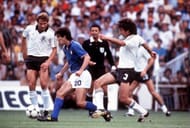
Paolo Rossi was born in the Santa Lucia area of Prato, Italy on 23 September 1956. He started playing professional football when he was signed up in Juventus in 1973, where he won a runners-up medal for the 1973 International Cup.
Rossi, however, was believed to be frail after he underwent three knee operations in his early career life. To gain more experience, he was loaned to Como in 1975. Despite making 6 appearances in Serie A, he failed to score even one goal. His career turned a new leaf in 1976 when he was engaged by Vicenza on loan. Under the guidance of coach Fabbri, Rossi netted 21 goals in his first year as a centre-forward, won the Serie B golden boot, and promoted his team to Serie A.
In 1980, unfortunately, he was suspended for 3 years for alleged match-fixing. He was bought by Juventus in 1981 and led Italy to victory in the World Cup in the year 1982. As Italy’s top scorer, he was awarded the prestigious 1982 Ballon d’Or, Golden Boot for the highest goals (6) in the World Cup and also the Golden Ball award for the best player in the tournament.
Undoubtedly one of the best players in football’s history, he found himself in Pele’s Top 125 greatest living footballers in 2004. Today, Rossi engages himself with sports journalism.
#4 Gary Winston Lineker
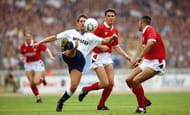
Gary Winston Lineker, born in Leicester in 1960, is unquestionably one of the best footballers England has ever had.
Lineker rose up in his ranks at the Leicester City club and scored 19 goals in the 1981-82 season. By 1985, he was attracting the attention of bigger clubs and was bought by Everton.
He emerged as the top goal scorer in the English League, with 30 goals in hand. In 1986, he led the English team in the World Cup at Mexico and ended as the highest goal scorer (6) of the tournament, for which he was awarded the Golden Boot.
Seeing his exceptional performance, Barcelona signed him up for £2.8 million. He helped the team win the Copa del Ray in 1988 and the European Cup Winner’s Cup in 1989. Lineker scored 48 goals in the 80 games that he played for England. Then he moved to Tottenham Hotspur, followed by Japanese club Nagoya Grampus Eight.
After retiring from professional football in 1994, he has had a glorious media career.
#3 Antônio de Oliveira Filho
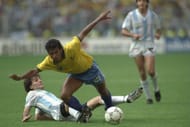
Antônio de Oliveira Filho, better known as Careca, was born in Araquara in the Brazilian state of São Paulo in 1960. He joined a local club Guarani in the year 1978, with which he won the Brazilian Championships and the Brazilian Second Division in 1981.
With an impressive opening statement, he had established himself as one of the country’s best forwards. In 1983, he was signed up by São Paulo. He led the team to win the Brazilian Championships in 1986 by defeating his former club Guarani in the finals. Soon, he was awarded the Bola de Ouro, recognising him as one of the country’s best forwards.
The 1986 World Cup might have been a disappointment for the country, but was a huge triumph for Careca, with him ending second on the goal scorer’s list (with 5 goals), after Lineker. In 1987, he moved to Napoli, where played alongside Bruno Giordano and Diego Maradona. After 6 glorious years, which included him winning the UEFA Cup, he moved to Japan in 1993. He was 40 when he retired; having scored 30 goals in the 64 games he played for Brazil.
#2 Rudolf "Rudi" Völler
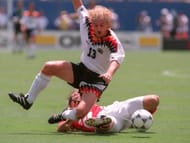
Rudolf "Rudi" Völler was Germany’s number one forwards in the 80s and went on to become the national team’s manager. He was born in 1960, in Hanau, West Germany.
He won his first cap in the year 1982, where he played for the Bundesliga club Werder Bremen. Known as the “Master of the Penalty Area”, Völler was awarded the Player of the Year in 1983. He played the Euro 1984 and the Mexican World Cup in 1986, before being transferred to Roma in 1987, where he won the Coppa Italia in 1991.
In his very first season at Marseille, which he joined in ‘92, Völler led the team to win the UEFA Champions League (which was later renounced due to a bribery scandal). He scored 47 goals in the 90 matches he played for the Germany national team, including eight in World Cup final rounds.
Rudi later moved to Bayer Leverkusen in 1994, before retiring in ’96.
#1 Preben Elkjær

Preben Elkjær, considered Denmark’s all-time best forwards, was born in 1957 at Copenhagen. He first played with Vanløse IF, where he scored 7 goals in 15 matches in a season.
He’s known as one of football’s most interesting characters, known for partying all night long before matches. Being a heavy smoker and not taking care of his physique at times, Elkjær had a rough time with managers.
Despite all of this, he signed for Hellas Verona, where he played an active role in winning the Serie A title. For the Danish national team, he scored a total of 40 goals in 11 years, taking the country to new heights at Euro 1984 and the 1986 World Cup.
With his amazing strength, proficient dribbling and vibrant shots, Elkjær was awarded the Golden Boot in the World Cup. After giving up playing football, he coached Silkeborg IF and then headed TV sports channel TVS.
